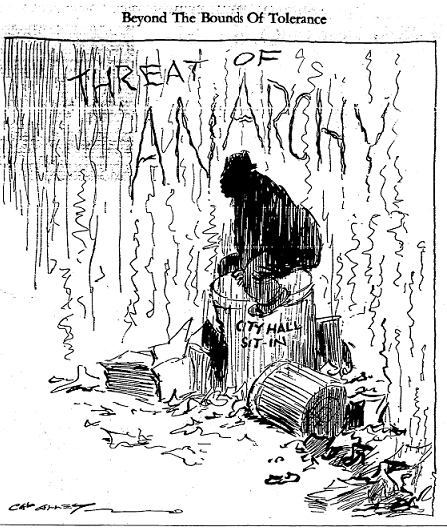
“Threat of Anarchy”. The Commercial Appeal, February 23, 1968.
Feb 22, 1968
Earlier today around 700 striking sanitation workers, ministers, political activists, and labor representatives held a sit in on the floor of the city council chambers at city hall. The event saw members of the housing, building, and public works committee of the newly elected city council abandon the floor completely to the participants in the demonstration. The ferocity of the protest prompted the committee to recommend that the full city council, which meets tomorrow, grant the union formal recognition through a dues checkoff.
The sit in followed a committee meeting marked by intense friction between union representatives and committee chairman Fred Davis. Throughout the meeting, the union representatives insisted that they speak for the sanitation workers. Chairman Davis, one of three black city councilmen, wanted none of it and pushed to hear directly from the workers.
Union representative Jesse Epps alleges that Chairman Davis accused him of trying to bribe the men to not speak. Mr. Epps recalls Chairman Davis kept saying, “There’s a man back there…He’s a man who works for the public works department. How come he can’t come down here and say what the men want to do?” Mr. Epps and other union officials responded by summoning nearly 700 strikers to flood the council chambers, which normally seats 427.
At that point, it quickly became “chaos” according to Chairman Davis who vainly tried to get some of the men to leave so the chamber wouldn’t be overcapacity. The men began to verbally attack Chairman Davis and other members of the committee. “They turned on him like wolves” said Councilman Robert James referring to the committee chairman and the strikers.
A number of ministers from the black community, who had accompanied the union representatives to the committee meeting, acted as “shock troops” in the words of Councilman Jerred Blanchard. Rev. James Lawson led the men in a chant of “You’re not with us” while Rev. Ezekiel Bell yelled “You’re not going to put us back in the balcony. We’re out of the balcony. You’ve had us there for three hundred years and we’re not going back!”
The intensity of the feeling behind the demonstration took council members by surprise. Rev. James Netters, another of the black city councilmen, recalls the incident, “Somehow I got a feeling I had never had before because I had never been the object of negro hate. I’ve always been pushing for my people. Now all of a sudden, I got the feeling that now I’m the object. I’m on the other side. It was the most weird feeling I’ve ever had. I felt sick inside.”
Councilman Wyeth Chandler attempted to defuse the situation by suggesting moving the meeting to an auditorium nearby with a larger seating capacity, and the workers seemed to accept this with some of them moving to exit the chamber. However, Chairman Davis made an announcement over the microphone that the committee would reconvene at two o’clock in the auditorium; it was about noon at the time. The strikers immediately believed the committee was trying to shut down the demonstration through an indefinite adjournment, and they dug in their heels.
Union leaders urged the men not to surrender the chamber while the committee hadn’t endorsed even one of their demands. Political activist O. Z. Evers encouraged the strikers to “Stay until the council recognizes the union and recognizes they can overrule the Mayor. If they want to take someone to jail, they can take all of us.” The crowd cheered. Chairman Davis attempted once again to re-establish order, but someone started singing the hymn, “We Shall Not Be Moved”
By that point, the committee chairman had had enough. “This meeting is adjourned” he said as he and the other council members present got up and moved to another room. Meanwhile, the strikers remained in possession of the floor. The men began to sing old spirituals as the clergy among the group tried to keep the energy going.
Because it was around lunch, someone among the strikers sent out for food, and within an hour, the wives of some of the men had brought bread and meat to make sandwiches. As the men ate, the strike leaders made speeches to keep their spirits up.
The men seemed prepared to hold the room indefinitely. Outside 142 officers of the Memphis police department were on standby within a block of city hall. Mayor Loeb, who was in the building during the committee meeting, had called them. The mayor has since admitted he considered ordering the officers to clear the council chamber of the protesters. However, the city council and the strikers reached a compromise before he could do so.
To end the sit in without further incident, members of the city council met with union leaders to work out a deal. According to Councilman Robert James, a number of his colleagues seemed willing to settle with the union at any cost, “because they thought that we were in for trouble.” A few councilmen went upstairs briefly to try to get the mayor to grant the men a modest pay raise and limited union recognition. However, he remained firm.
Adding to the tension were some of the speeches by ministers and civil rights leaders who had accompanied the strikers. According to Councilman Chandler, one speech by Rev. Ezekiel Bell will likely turn, “the white community in general solidly against them [the strikers].”
By Rev. Bell’s account, his speech concerned his interpretation of the cotton and steamboat symbols on the seal of the city of Memphis, a large version of which hangs in the council chamber. He “talked about the steamboat having brought our folk down the river” and “that the cotton was symbolic of us having picked all of it, and yet all of us were still poverty stricken.”
However, some council members allege that some of the more controversial remarks in the speech were threats of vandalism against city hall. Councilman James quoted Rev. Bell as saying that there were, “lot of us here and very limited toilet facilities, and we’re not going to guarantee what this carpet (in the council chambers), beautiful red carpet, what this carpet is going to look like in the morning.”
Councilman Chandler recounted, “Ezekiel Bell began to leap up in the air about no we don’t need to worry about fire regulations in our building and if we don’t like what goes on here, we’ll tear it down. We’ll tear down the seal. It has a cotton bail on it, and that’s the symbol of all our slavery days.” While Councilman Thomas Todd summed up the speech as, “We’re going to burn the city down, tear the council chamber apart, and if you don’t give us what we want we’re just going to make this place a shambles.”
The implication of all the statements is that it seemed possible to the council members that the strikers might have defaced or vandalized the council chamber.
Either way, it seems likely that Rev. Bell’s remarks have handed Mayor Loeb and others who oppose the strikers a useful talking point. For example, Richard Lentz of the Commercial Appeal, a publication that tends to show bias against the strikers, plans to quote the controversial parts of his speech extensively in tomorrow’s issue of the paper.
Until now, the strike has largely been seen as a labor matter. However with this latest incident, it seems to have acquired racial overtones.
It was only late in the afternoon that Councilman Lewis Donelson worked out a compromise that the union would accept in exchange for an end to the sit in. The committee agreed to recommend that the full city council formally recognize the union by granting it a dues checkoff. Further, Councilman Donelson promised that the full city council will meet Friday, tomorrow, to consider the committee’s recommendation. Only a portion of the city council was present at city hall during the sit in.
Chairman Davis read out the compromise to the men, “The recommendation of our committee to the Council will be that the city recognize the union as the collective bargaining agent and that there be some form of dues checkoff.” The mood among the strikers turned to jubilation as cheers broke out in the aisles of the council chamber.
For the moment, the strike seems to be on the verge of being over, and the men believe they have managed to push the council to take action that will end the dispute.
“Interview with Ezekiel Bell”, (Part 8). YouTube, Uploaded by Crossroads Archive. Original tapes found in Memphis Search for Meaning Committee Records, University of Memphis Libraries Preservation and Special Collections Department.
“Interview with Fred Davis”, (Part 12). YouTube, Uploaded by Crossroads Archive. Original tapes found in Memphis Search for Meaning Committee Records, University of Memphis Libraries Preservation and Special Collections Department.
“Interview with Jerred Blanchard”. YouTube, Uploaded by Crossroads Archive. Original tapes found in Memphis Search for Meaning Committee Records, University of Memphis Libraries Preservation and Special Collections Department.
“Interview with Jesse Epps”, (Part 10). YouTube, Uploaded by Crossroads Archive. Original tapes found in Memphis Search for Meaning Committee Records, University of Memphis Libraries Preservation and Special Collections Department.
“Interview with Rev. James Netters”, (Part 6). YouTube, Uploaded by Crossroads Archive. Original tapes found in Memphis Search for Meaning Committee Records, University of Memphis Libraries Preservation and Special Collections Department.
“Interview with Robert James”, (Parts 8, 9). YouTube, Uploaded by Crossroads Archive. Original tapes found in Memphis Search for Meaning Committee Records, University of Memphis Libraries Preservation and Special Collections Department.
“Interview with Wyeth Chandler”, (Parts 5, 7). YouTube, Uploaded by Crossroads Archive. Original tapes found in Memphis Search for Meaning Committee Records, University of Memphis Libraries Preservation and Special Collections Department.
Lentz, Richard. “Committee Gives In To Sit-In Of Strikers, But Loeb Holds Firm; Strike Boosters Hold Picnic In Chambers of City Council.” Commercial Appeal (Memphis, TN), Feb. 23, 1968.
Sweat, Joseph. “Committee Gives In To Sit-In Of Strikers, But Loeb Holds Firm; Action is Rebuff; 700 Workers, Friends Push into Chamber; Council to Meet Today.” Commercial Appeal (Memphis, TN), Feb. 23, 1968.
Beifuss, Joan Turner. At The River I Stand. 2nd ed. Memphis: St. Luke’s Press, 1990.






